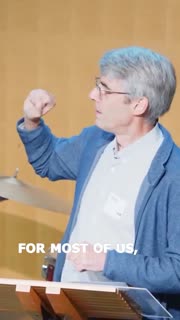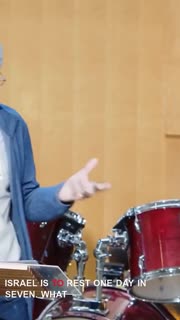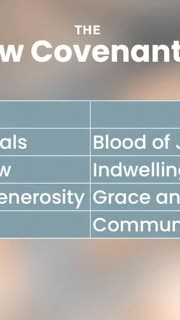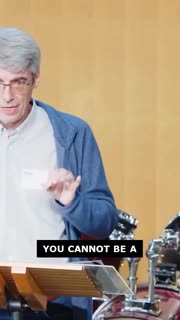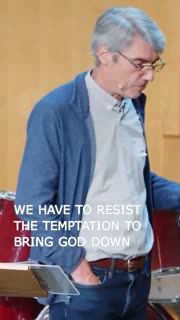Embodying God's Covenant: A Call to Holiness
Summary
Summary:
Today, we explored the profound narrative of the covenant God established with Israel at Mount Sinai, a pivotal moment that continues to resonate with us today. The journey of the Israelites from Egypt to Sinai is not just a collection of isolated stories but a cohesive narrative that reveals God's desire for a relationship with His people. At Sinai, God proposed a covenant, inviting Israel to be a kingdom of priests and a holy nation. This covenant was not merely a set of rules but a call to embody God's holiness and justice, reflecting His character to the world.
The covenant ceremony involved sacrifices and the sprinkling of blood, symbolizing a binding agreement between God and Israel. However, the Israelites' quick descent into idolatry with the golden calf highlighted their struggle to remain faithful. Despite their failure, God's response was one of grace and mercy, renewing the covenant and revealing His steadfast love.
This narrative points us to the new covenant established through Jesus Christ, characterized by grace and sacrifice. As followers of Christ, we are called to be a royal priesthood and a holy nation, reflecting God's love and justice in our communities. This calling requires us to live in community, loving one another sacrificially, and resisting the temptation to conform God to our image. Instead, we are to be transformed by the Holy Spirit, allowing God to work through us to bless the world.
Key Takeaways:
1. The Covenant as a Unified Story: The covenant at Sinai is part of a larger narrative that reveals God's desire for a relationship with His people. It is not just a set of isolated stories but a cohesive story that calls us to see the Bible as a unified narrative of God's redemptive plan. [03:30]
2. The Role of the Covenant: The covenant was a binding agreement that called Israel to be a kingdom of priests and a holy nation. It was a call to embody God's holiness and justice, reflecting His character to the world. This calling is still relevant for us today as we seek to live out our faith in community. [14:14]
3. The Significance of the Sabbath: The Sabbath was a sign of the covenant, reminding Israel of their dependence on God and their call to be holy. It was a radical act of trust and a witness to the nations, showing that their identity was rooted in God, not in their productivity. [19:53]
4. The Danger of Idolatry: The golden calf incident highlights the danger of idolatry and the temptation to conform God to our image. It serves as a warning to us to resist the urge to control God and instead allow Him to transform us into His image. [25:40]
5. The New Covenant in Christ: The new covenant, established through Jesus' sacrifice, calls us to live by grace and love. It invites us to be a community that reflects God's love and justice, living sacrificially and allowing the Holy Spirit to work through us to bless the world. [33:40]
Youtube Chapters:
- [0:00] - Welcome
- [01:50] - Introduction to the Covenant
- [03:30] - Understanding the Old Testament as One Story
- [04:57] - The Story of the Covenant
- [06:30] - Encountering God at Sinai
- [08:46] - The Ten Commandments
- [10:15] - The Covenant Ceremony
- [12:06] - The Significance of Blood in the Covenant
- [14:14] - Israel's Calling as a Kingdom of Priests
- [17:24] - The Ten Commandments and Their Purpose
- [19:53] - The Sabbath as a Sign of the Covenant
- [21:27] - The Radical Trust of the Sabbath
- [23:29] - The Golden Calf Incident
- [25:40] - Israel's Idolatry and God's Response
- [33:40] - The New Covenant in Christ
- [35:51] - Our Calling as a Holy Nation
- [37:09] - Resisting the Temptation to Control God
- [40:08] - Personal Story and Closing Reflections
Study Guide
Bible Study Discussion Guide
Bible Reading:
1. Exodus 19:3-6
2. Exodus 24:3-8
3. 1 Peter 2:9
---
Observation Questions:
1. What was the significance of the covenant ceremony at Mount Sinai, and how did it involve the use of blood? [12:06]
2. How did the Israelites respond to God's proposal of the covenant, and what actions did they take to confirm it? [10:15]
3. What was the role of the Sabbath in the covenant, and why was it considered a sign of the relationship between God and Israel? [19:53]
4. How did the Israelites' actions with the golden calf contrast with their earlier commitment to the covenant? [25:40]
---
Interpretation Questions:
1. In what ways does the covenant at Sinai reflect God's desire for a relationship with His people, and how does this relate to the concept of a "kingdom of priests"? [14:14]
2. How does the narrative of the golden calf incident serve as a warning against idolatry, and what does it reveal about human nature? [25:40]
3. How does the new covenant through Jesus Christ differ from the old covenant, and what implications does this have for believers today? [33:40]
4. What does it mean to be a "holy nation" in the context of the new covenant, and how can this be lived out in a community setting? [35:51]
---
Application Questions:
1. Reflect on the idea of the Bible as a unified narrative. How does viewing the Bible this way change your understanding of God's redemptive plan? [03:30]
2. The Israelites were called to be a kingdom of priests and a holy nation. How can you embody this calling in your daily life and interactions with others? [14:14]
3. The Sabbath was a radical act of trust for the Israelites. What are some ways you can practice trust in God in your own life, especially in areas where you feel the need to be productive? [19:53]
4. Consider the dangers of idolatry in your own life. Are there areas where you might be tempted to conform God to your image rather than allowing Him to transform you? [25:40]
5. The new covenant calls us to live by grace and love. What are some practical ways you can demonstrate sacrificial love within your community this week? [33:40]
6. How can you actively participate in your church community to reflect God's love and justice, and what steps can you take to strengthen these relationships? [35:51]
7. Reflect on the pastor's story about relinquishing control and allowing the Holy Spirit to work. How can you apply this lesson in your spiritual journey? [43:12]
Devotional
Day 1: The Covenant as a Unified Story
The covenant at Sinai is not just an isolated event but part of a larger narrative that reveals God's desire for a relationship with His people. This story is woven throughout the Bible, showing a consistent theme of God's redemptive plan. The journey from Egypt to Sinai is a testament to God's faithfulness and His call for His people to be set apart. Understanding the covenant as a unified story helps us see the Bible as a cohesive narrative, inviting us to participate in God's ongoing work in the world. This perspective encourages us to view our own lives as part of this grand story, where we are called to reflect God's love and justice. [03:30]
Exodus 19:5-6 (ESV): "Now therefore, if you will indeed obey my voice and keep my covenant, you shall be my treasured possession among all peoples, for all the earth is mine; and you shall be to me a kingdom of priests and a holy nation. These are the words that you shall speak to the people of Israel."
Reflection: How can you see your life as part of God's larger story today? What specific actions can you take to align your daily life with His redemptive plan?
Day 2: The Role of the Covenant
The covenant at Sinai was a binding agreement that called Israel to be a kingdom of priests and a holy nation. This was not merely a set of rules but a call to embody God's holiness and justice, reflecting His character to the world. The covenant was a profound invitation to live in a way that demonstrated God's love and righteousness. Today, this calling remains relevant as we seek to live out our faith in community, embodying the values of the kingdom of God. We are invited to be a people who reflect God's character, living in a way that draws others to Him. [14:14]
1 Peter 2:9 (ESV): "But you are a chosen race, a royal priesthood, a holy nation, a people for his own possession, that you may proclaim the excellencies of him who called you out of darkness into his marvelous light."
Reflection: In what ways can you embody God's holiness and justice in your community this week? Identify one specific action you can take to reflect His character to those around you.
Day 3: The Significance of the Sabbath
The Sabbath was a sign of the covenant, reminding Israel of their dependence on God and their call to be holy. It was a radical act of trust, a witness to the nations that their identity was rooted in God, not in their productivity. Observing the Sabbath was a declaration that God was their provider and sustainer. In today's fast-paced world, the principle of Sabbath invites us to rest and trust in God's provision, reminding us that our worth is not tied to our work. It challenges us to prioritize our relationship with God and to find our identity in Him. [19:53]
Isaiah 58:13-14 (ESV): "If you turn back your foot from the Sabbath, from doing your pleasure on my holy day, and call the Sabbath a delight and the holy day of the Lord honorable; if you honor it, not going your own ways, or seeking your own pleasure, or talking idly; then you shall take delight in the Lord, and I will make you ride on the heights of the earth; I will feed you with the heritage of Jacob your father, for the mouth of the Lord has spoken."
Reflection: How can you incorporate a Sabbath rest into your week to remind yourself of your dependence on God? What specific steps can you take to make this time sacred and restorative?
Day 4: The Danger of Idolatry
The golden calf incident highlights the danger of idolatry and the temptation to conform God to our image. It serves as a warning to resist the urge to control God and instead allow Him to transform us into His image. Idolatry is not just about worshiping physical idols but can also be seen in the ways we prioritize other things above God. This narrative challenges us to examine our hearts and identify anything that may be taking God's rightful place. It calls us to surrender our desires and allow God to shape us according to His will. [25:40]
Deuteronomy 4:23-24 (ESV): "Take care, lest you forget the covenant of the Lord your God, which he made with you, and make a carved image, the form of anything that the Lord your God has forbidden you. For the Lord your God is a consuming fire, a jealous God."
Reflection: What are some modern-day idols in your life that may be taking precedence over your relationship with God? How can you begin to surrender these to Him today?
Day 5: The New Covenant in Christ
The new covenant, established through Jesus' sacrifice, calls us to live by grace and love. It invites us to be a community that reflects God's love and justice, living sacrificially and allowing the Holy Spirit to work through us to bless the world. This covenant is characterized by grace, offering us forgiveness and a new identity in Christ. As followers of Jesus, we are called to be a royal priesthood and a holy nation, embodying the values of the kingdom of God. This calling requires us to live in community, loving one another sacrificially and allowing God to transform us. [33:40]
Hebrews 8:10-12 (ESV): "For this is the covenant that I will make with the house of Israel after those days, declares the Lord: I will put my laws into their minds, and write them on their hearts, and I will be their God, and they shall be my people. And they shall not teach, each one his neighbor and each one his brother, saying, ‘Know the Lord,’ for they shall all know me, from the least of them to the greatest. For I will be merciful toward their iniquities, and I will remember their sins no more."
Reflection: How can you actively participate in your community to reflect God's love and justice? Identify one way you can serve others sacrificially this week, allowing the Holy Spirit to work through you.
Quotes
1) "For most of us, our understanding of the Old Testament comes from Sunday school or Hollywood, one of the two. And we have these little islands of knowledge, these little stories that we've heard of. We've heard of Noah, we've heard of, you know, the plagues on Egypt, we've heard of King David, and, you know, we've heard of David and Goliath. Things like these, but often they're just little islands. But the Bible was never intended to be understood as little stories. It is one story. And what we're doing in this series is we are working our way through what we now call the Old Testament, the Hebrew Bible, and we are seeking to see how these things connect together." [03:30] (55 seconds)
2) "Israel is to rest one day in seven. What does that mean they're not to work. What does it mean not to work? It's to be unproductive from an economic point of view. What does that mean to a society that is organized around agriculture and production? Well, giving up one 7th of your time, when you could be making sure that your crops are producing and so forth, means you have to rely on God, that in six days he will deliver you the productivity you need for seven. And then it reminds them that they are to be holy. The Sabbath is devoted to goddess. Their time is given over to him. They are separating themselves, as it were, from the normal to be in the holy." [19:53] (59 seconds)
3) "The old covenant was introduced by the blood of animals, the new by the blood of Jesus himself. In the old, there was the written law telling you how to be a follower of God. In the new, we receive the indwelling Holy spirit. And while the old was to be characterized by justice and generosity, the new by grace and sacrifice, Jesus said, it says in John, a new commandment, I give you that you love one another, just as I have, have loved you. The love in the new covenant is about sacrifice." [33:40] (61 seconds)
4) "You cannot be a holy nation on your own. We are called into a community. The world is to look at the church and see Christ. Yes, we are to reflect Christ in our individual lives. But it is in the church that God has decreed that we will be the blessing. You are to love one another. He's talking about within the church now. Actually, loving one another is not that easy. Right? It's almost as hard for me to love you as it is for you to love me. And we're to do so sacrificially." [35:51] (58 seconds)
5) "We have to resist the temptation to bring God down to fit our image. This was Israels almost fatal mistake, if you like. In the golden calf, they saw God upon the mountain. They heard God speak and they said were too frightened. Moses, you do it. We'd rather be back here. We'd rather go with what we know. And what did they know? Well, they were living in Egypt. What they knew was idols, idol worship." [37:09] (39 seconds)
6) "We have to let go, I would say sometimes, not every Sunday, but we have to let go of this idea that we are in control. When God appears. When God appears and the Holy Spirit is doing his thing. What was it Rick said? Crazy stuff happens, wasn't it? Crazy stuff happens. Let us not be those who shrink back. Let us not be those who seek to make God in our own image, but let us be those who seek to be his image bearers in this world. To the blessing of all." [43:12] (54 seconds)
